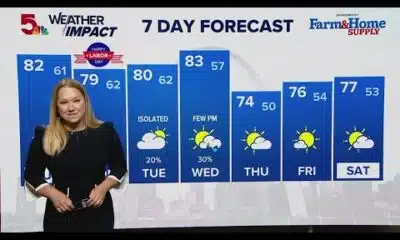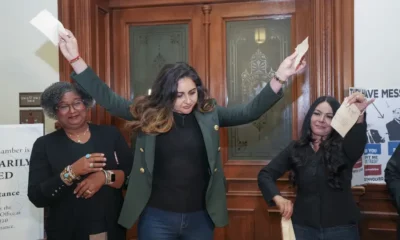News from the South - Alabama News Feed
Many medical treatments could be affected by Supreme Court transgender ruling
by Nada Hassanein, Alabama Reflector
July 9, 2025
This story originally appeared on Stateline.
The justices’ reasoning in the recent U.S. Supreme Court ruling upholding Tennessee’s ban on youth gender-affirming care could have much broader implications, perhaps opening the door to state restrictions on health care for other groups of people, experts say.
The ruling could give states leeway to make rules on any other sex-related treatment — potentially affecting people of all genders, according to legal and health policy scholars.
In U.S. v. Skrmetti, three families and a physician argued that a Tennessee law barring the use of puberty blockers and hormone treatments for transgender minors violates the U.S. Constitution’s equal protection clause. They asserted that the law discriminates on the basis of sex, since the state allows the use of similar treatments for cisgender boys and girls with other medical conditions.
GET THE MORNING HEADLINES.
The court weighed the argument of whether the law treats people differently, subject to what is called heightened scrutiny. Under this higher level of judicial review, the state must identify an important objective for a law and demonstrate how it helps accomplish that goal.
But the court’s conservative majority last month ruled that the Tennessee ban doesn’t merit such scrutiny because its restrictions are based on age and the medical uses of certain drugs, not sex. Twenty-six other states have similar laws to Tennessee’s.
The Tennessee law “prohibits healthcare providers from administering puberty blockers and hormones to minors for certain medical uses, regardless of a minor’s sex,” Chief Justice John Roberts wrote. “The law does not prohibit certain medical treatments for minors of one sex while allowing those same treatments for minors of the opposite sex.”
Justice Elena Kagan disputed that view during oral arguments.
“The whole thing is imbued with sex. It’s based on sex,” Kagan said. “You might have reasons for thinking it’s an appropriate regulation and those reasons should be tested and respect given to them, but it’s a dodge to say, ‘This is not based on sex, it’s based on medical purpose,’ when the medical purpose is utterly and entirely about sex.”
Tennessee’s law says the state has a “compelling interest in encouraging minors to appreciate their sex.”
Some legal and policy experts say the court’s reasoning in Skrmetti could allow states to enact further restrictions on abortion, contraception, in vitro fertilization or other health care, particularly sex-specific treatment, sidestepping previous protections.
Jules Gill-Peterson, an associate professor of transgender history at Johns Hopkins University, called the ruling “consequential.”
“The court has basically decreed a new form of legal and political vulnerability that did not exist before the Skrmetti case,” she said. ”Everyone has a sex. Everyone is now much more vulnerable to sex discrimination in this country, even if it hasn’t taken place yet.”
She added that women, especially, could see rollbacks.
“It will greatly advance people’s ability to discriminate against women,” she said. “This case really kind of now altered the legal landscape in a pretty significant way.”
The court has basically decreed a new form of legal and political vulnerability that did not exist before the Skrmetti case.
– Jules Gill-Peterson, Johns Hopkins University associate professor
The ruling marks “a deeply concerning direction,” said Kellan Baker, executive director of the Institute for Health Research and Policy at Whitman-Walker, an LGBTQ+ health nonprofit in the Washington, D.C., area.
“At any time and for any reason, a state legislature could decide that any medical indication is suddenly not politically palatable, and move to ban access to any type of care that legislature wants to target,” Baker said.
He added that the decision is likely to have “serious political ramifications” for more than just transgender people.
Eric Neiman, an attorney at Epstein Becker Green, a law firm focused on health care and employment cases, agreed the ruling “could allow states to regulate all kinds of medical procedures for children and adults.”
Ultimately, Neiman said, the decision indicates “deference to states in decision-making about care that can be provided to children.”
Sex-based protections
The decision builds on the 2022 Dobbs ruling that overturned Roe v. Wade, said Katie Keith, the founding director of the Health Policy and the Law Initiative at the O’Neill Institute at Georgetown University Law Center.
“I don’t know that we would have seen this decision in the same way if we hadn’t had the Dobbs decision three years ago and the erosion of sex-based protections,” she said.
Keith pointed to state actions that followed Dobbs, such as a decision by Iowa’s attorney general to halt funding for emergency contraceptives for sexual assault victims. The policy drew significant outcry, which resulted in the office resuming funding.
Leah Litman, a University of Michigan law professor, wrote in a recent essay in The Atlantic that Roberts and the other conservative justices revived “an outdated case” when they cited the 1974 decision in Geduldig v. Aiello, in which the justices ruled it was permissible to deny certain benefits for pregnancy-related disabilities.
“If the Republican appointees plan to revive this older case, they will take the law and the country back to a time when the government used the existence of ‘biological differences’ between men and women to excuse all kinds of discrimination against women,” Litman wrote.
Also at stake are previous appellate court decisions out of West Virginia and North Carolina that protected transgender adults’ access to public insurance coverage for transgender care. The Supreme Court threw out those rulings and ordered appellate judges to reevaluate in light of the Skrmetti decision. Another case involving gender-affirming medical care out of Idaho will also have to be reevaluated.
‘Scientific and policy debates’
Critics of gender-affirming health care for youth hailed the Skrmetti ruling, citing recent research that calls into the question the efficacy of such treatments. The decision was “a monumental victory, for children, science, and common sense,” Kristen Waggoner, president and CEO of Alliance Defending Freedom, wrote in an emailed statement.
But dozens of leading U.S. medical organizations, including the American Academy of Pediatrics and the American Academy of Child and Adolescent Psychiatry, have stressed that gender-affirming care for minors is safe and essential.
“Denying patients access to this care not only undermines their health and safety, it robs them of basic human dignity,” Dr. Susan J. Kressly, president of the American Academy of Pediatrics, said in a statement following the decision. “The ruling also sets a dangerous precedent for legislative interference in the practice of medicine and the patient-physician relationship that is at the core of our health system.”
But in his opinion, Roberts insisted that the case carries “scientific and policy debates.” “The Equal Protection Clause does not resolve these disagreements. Nor does it afford us license to decide them as we see best,” he wrote.
Justices Ketanji Brown Jackson and Sonia Sotomayor said the majority’s arguments mirror those made in defense of banning interracial marriage in the Loving v. Virginia case. The Supreme Court struck down the ban in 1967.
“In a passage that sounds hauntingly familiar to readers of Tennessee’s brief, Virginia argued in Loving that, should this Court intervene, it would find itself in a ‘bog of conflicting scientific opinion upon the effects of interracial marriage,’” Sotomayor wrote in her dissent.
Advocates say the narrowness of the Skrmetti decision could make it possible to challenge state bans on health care for trans youth on other grounds.
“[The ruling] is not a blanket endorsement of the various state bans on medical care for transgender youth. It is a tortured and narrow upholding of Tennessee’s,” said Baker, of Whitman-Walker. “The court sidestepped the actual question about equal protection.”
For example, a plaintiff could argue that parents have a constitutional right to make medical decisions for their children. Supporters of transgender rights also noted the decision did not take aim at equal protection rights for transgender adults, but other obstacles remain amid an onslaught from the Trump administration.
President Donald Trump has issued an executive order recognizing only biological sex and not gender identity. The administration has also frozen federal grant money dedicated to LGBTQ+ health and issued warnings for gender-affirming care for minors.
And the administration last month finalized a rule barring health plans offered on Affordable Care Act exchanges from covering gender-affirming care — defined as surgeries, puberty blockers and hormone treatment — as an essential health benefit. The decision means that payments for such care cannot be applied toward deductibles.
“[The court] signaled that perhaps some of the kinds of protections, or maybe just backstops, people had been hoping existed, they’re just not there,” Gill-Peterson said.
Stateline reporter Nada Hassanein can be reached at nhassanein@stateline.org.
Stateline is part of States Newsroom, a nonprofit news network supported by grants and a coalition of donors as a 501c(3) public charity. Stateline maintains editorial independence. Contact Editor Scott S. Greenberger for questions: info@stateline.org.
Independent Journalism for All
As a nonprofit newsroom, our articles are free for everyone to access. Readers like you make that possible. Can you help sustain our watchdog reporting today?
Alabama Reflector is part of States Newsroom, a nonprofit news network supported by grants and a coalition of donors as a 501c(3) public charity. Alabama Reflector maintains editorial independence. Contact Editor Brian Lyman for questions: info@alabamareflector.com.
The post Many medical treatments could be affected by Supreme Court transgender ruling appeared first on alabamareflector.com
Note: The following A.I. based commentary is not part of the original article, reproduced above, but is offered in the hopes that it will promote greater media literacy and critical thinking, by making any potential bias more visible to the reader –Staff Editor.
Political Bias Rating: Center-Left
This article largely presents the issue of transgender health care restrictions with a focus on the concerns raised by legal experts, medical authorities, and advocates who warn against the Supreme Court’s conservative ruling. It highlights potential negative consequences for transgender rights and broader sex-based protections, quoting critics and experts who emphasize risks of increased discrimination and legislative interference in health care. While it mentions conservative legal reasoning and supporters of restrictions, the overall tone and framing emphasize the adverse impact on marginalized groups and critique the ruling, reflecting a center-left perspective sympathetic to LGBTQ+ rights and wary of conservative judicial decisions.
News from the South - Alabama News Feed
Alabama state grocery tax to fall 1% on Monday
by Ralph Chapoco, Alabama Reflector
August 31, 2025
Alabama’s state grocery tax is scheduled to drop on Monday as a law passed last spring takes effect.
The state portion of the grocery tax will fall from 3% to 2%, the result of campaigning by both liberal and conservative groups.
“This is great news for the people of Alabama. The latest grocery tax reduction – the second in three years – will make it easier for every Alabamian to make ends meet, especially in this time of persistently high food prices,” said Robyn Hyden, executive director of Alabama Arise, a civil rights advocacy organization that has been at the forefront of efforts to reduce the tax.
GET THE MORNING HEADLINES.
HB 386, sponsored by Rep. Danny Garrett, R-Trussville and passed during the 2025 legislative session, does not directly impact grocery taxes imposed by city or county governments, though the law allows local governments to cut those taxes if they wish. It forbids local governments from raising them further.
A message was sent to the Alabama Grocers Association seeking comment.
Most states exempt groceries from sales taxes. Alabama for years was one of a handful of states that fully taxed groceries, and had done so since the state first imposed sales taxes in 1939. State and local levies combined could raise the tax as high as 10% in some areas. Critics said the tax fell disproportionately on lower-income earners and added to food insecurity.
A family that spends $600 on groceries each month and paid a total 9% tax will see their tax on the groceries go from $54 a month to $48 a month, or from $648 a year to $576 a year.
Legislators for years resisted cutting the grocery tax, citing the potential impact it could have on the Education Trust Fund budget (ETF), which pays for most public education in the state. The ETF gets most state sales taxes; HB 386 was estimated to reduce revenue in the ETF by $121 million.
But a surplus of money in 2023 led lawmakers to push for a reduction in the grocery tax. HB 479, sponsored by Garrett, the chair of the House Ways and Means Education Committee and enacted in 2023, reduced the state grocery tax from 4%, the standard sales tax rate in the state, to 3%.
The bill opened the door for an additional reduction, but only if revenue in the ETF increased 3.5%. In the fall 2023, budget experts for the state forecasted tax receipts to increase by less than 2%.
Garrett, however, moved to reduce the tax last spring, saying a repeal of an income tax exemption on overtime wages would pay for the cut.
Even after reducing the state portion of the grocery tax bill in half, Alabama Arise is hoping for further reductions to eliminate the tax altogether.
“We continue to support our longstanding proposal to replace grocery tax revenue by capping or ending the state income tax deduction for federal income tax payments,” Hyden said. “Alabama is the only state to allow this full deduction, which overwhelmingly benefits the wealthiest households. Closing this skewed loophole would protect funding for public schools and ensure Alabama can afford to end the state sales tax on groceries forever.”
Independent Journalism for All
As a nonprofit newsroom, our articles are free for everyone to access. Readers like you make that possible. Can you help sustain our watchdog reporting today?
Alabama Reflector is part of States Newsroom, a nonprofit news network supported by grants and a coalition of donors as a 501c(3) public charity. Alabama Reflector maintains editorial independence. Contact Editor Brian Lyman for questions: info@alabamareflector.com.
The post Alabama state grocery tax to fall 1% on Monday appeared first on alabamareflector.com
Note: The following A.I. based commentary is not part of the original article, reproduced above, but is offered in the hopes that it will promote greater media literacy and critical thinking, by making any potential bias more visible to the reader –Staff Editor.
Political Bias Rating: Center-Left
The content presents a generally favorable view of reducing the grocery tax, highlighting the benefits for lower-income residents and food security, which aligns with progressive economic concerns. It includes perspectives from a civil rights advocacy group advocating for further tax reductions and critiques of tax policies benefiting wealthier households. However, it also fairly presents the legislative process and fiscal considerations, maintaining a balanced tone without strong partisan language, placing the overall bias slightly left of center.
News from the South - Alabama News Feed
Appeals court backs Venezuelan migrants’ effort to keep protected status
by Ariana Figueroa, Alabama Reflector
August 29, 2025
WASHINGTON — A three-judge panel of a federal appeals court unanimously ruled Friday the Trump administration likely acted unlawfully when it revoked extensions for temporary protections for more than 600,000 Venezuelans.
The U.S. Court of Appeals for the 9th Circuit panel agreed with the U.S. District Court for the Northern District of California’s March decision to block Homeland Security Secretary Kristi Noem’s decision to vacate two extensions of Temporary Protected Status, or TPS, to the group until October 2026 that the Biden administration put in place early this year.
One of the groups of Venezuelans had their TPS expire in April and the second is set to expire in September. The three-judge panel found that the Trump administration’s decision to end TPS in April is also likely unlawful.
The panel said Noem did not have the authority to revoke the TPS extensions granted by then-DHS Secretary Alejandro Mayorkas.
Judges Kim McLane Wardlaw, appointed by former President Bill Clinton, Salvador Mendoza Jr. and Anthony Johnstone, who were both appointed by former President Joe Biden, reached the decision.
The judges ruled that the law creating TPS, which grants work visas and deportation protections to nationals from a country deemed too dangerous to return to, was designed to create “predictable periods of safety and legal status for TPS beneficiaries” and the administration’s cancellation of the extension contradicted that goal.
“Sudden reversals of prior decisions contravene the statute’s plain language and purpose,” they wrote. “Here, hundreds of thousands of people have been stripped of status and plunged into uncertainty. The stability of TPS has been replaced by fears of family separation, detention, and deportation.”
“Congress did not contemplate this, and the ongoing irreparable harm to Plaintiffs warrants a remedy pending a final adjudication on the merits,” they continued.
A spokesperson for DHS did not return a message seeking comment Friday.
The U.S. Supreme Court allowed the Trump administration in May to end TPS for the group of 350,000 Venezuelans that expired in April. It is unclear how Friday’s order will affect that group.
The roughly 250,000 Venezuelans in another group are set to have their TPS expire Sept. 10 after the DHS revoked the extension.
Alabama Reflector is part of States Newsroom, a nonprofit news network supported by grants and a coalition of donors as a 501c(3) public charity. Alabama Reflector maintains editorial independence. Contact Editor Brian Lyman for questions: info@alabamareflector.com.
The post Appeals court backs Venezuelan migrants’ effort to keep protected status appeared first on alabamareflector.com
Note: The following A.I. based commentary is not part of the original article, reproduced above, but is offered in the hopes that it will promote greater media literacy and critical thinking, by making any potential bias more visible to the reader –Staff Editor.
Political Bias Rating: Center-Left
This content presents a legal and policy issue involving the Trump administration and the Trump-era Homeland Security Secretary Kristi Noem in a critical light, highlighting judicial decisions that deem actions taken under their leadership as likely unlawful. The article cites judges appointed by both Democratic and Republican presidents but emphasizes the ruling’s alignment with protections associated with the Biden administration’s policies. The framing tends to support immigration protections and criticizes the rollback efforts, which reflects a center-left perspective commonly supportive of immigrant rights and skeptical of Trump administration policies. However, the piece maintains a factual tone without overt opinion or partisan language, keeping it relatively balanced but leaning slightly to the left.
News from the South - Alabama News Feed
News 5 NOW at 8:00am August 29th, 2025
SUMMARY: On August 29, 2025, News 5 NOW covered major stories including the 20th anniversary of Hurricane Katrina, highlighting its catastrophic impact with over 1,800 deaths and $200 billion in damages. A family shared their experience living in New Orleans during the storm. The news also reported a deadly Russian drone attack in Ukraine, Claire’s closing nearly 300 stores including one in Foley, and Foley’s upcoming drainage project on US 98. Mobile County introduced 20 locations for US flag disposal. The show featured a poll on Alabama’s school cell phone ban, revealing mixed opinions. Viewers were reminded to expect busy Labor Day weekend traffic and possible rain.
Local News, Weather, Traffic, Sports, Questoin of the Day, Poll of the Day
-
News from the South - Texas News Feed5 days ago
Racism Wrapped in Rural Warmth
-
News from the South - Missouri News Feed6 days ago
Donors to private school voucher program removed from Missouri transparency site
-
News from the South - Alabama News Feed6 days ago
Child in north Alabama has measles, says Alabama Department of Public Health
-
News from the South - Tennessee News Feed6 days ago
A marsh bird found in Tennessee wetlands is endangered. FWS is drafting a plan.
-
News from the South - Missouri News Feed6 days ago
New Missouri law means state is no longer allowed to seize assets of prison inmates
-
News from the South - Georgia News Feed6 days ago
Voters head to the polls to pick new metro Atlanta state senator in low-turnout special election
-
News from the South - Texas News Feed6 days ago
Texas Democrats’ walkout prompts GOP retribution
-
Our Mississippi Home6 days ago
After the Winds: Kindness in Katrina’s Wake









































